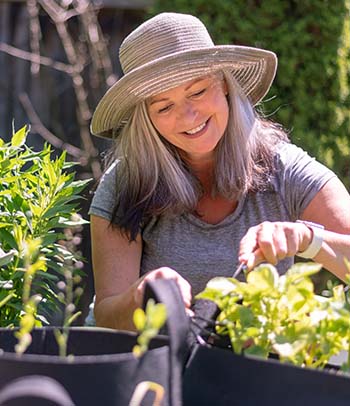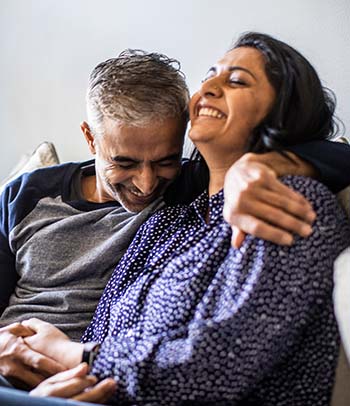Cancer is often unpredictable, but there are things you can do to help reduce your cancer risk.
National Cancer Prevention Month is a great time to learn about the latest research and guidelines for cancer prevention. The American Association for Cancer Research reports that more than 4 out of 10 cancer cases and almost half of all cancer-related deaths in the United States are associated with preventable risk factors. Some of these risk factors include smoking, excess body weight, unhealthy diet, exposure to ultraviolet radiation and certain infections.
Almost half of all cancer-related deaths in the United States are associated with preventable risk factors.
Your lifestyle, your genes and the environment around you may increase or decrease your chance of getting cancer. Cancer prevention and early detection can lead to better outcomes. Cancer screening is especially important because most people who get cancer do not have a family history of the disease. Even so, it’s good to know your family’s health history of all diseases because they may increase your risk. Plus, this information will help you and your health care provider determine which screening tests are right for you and when to begin screening.
Eight Lifestyle Choices to Help Prevent Cancer
 Your health is affected every day by the lifestyle choices you make. Cancer is usually caused by many factors over time. At any stage of your life, there are opportunities to prevent cancer or delay the onset of new cancer. The Prevent Cancer Foundation recommends these eight important lifestyle choices for helping to prevent cancer.
Your health is affected every day by the lifestyle choices you make. Cancer is usually caused by many factors over time. At any stage of your life, there are opportunities to prevent cancer or delay the onset of new cancer. The Prevent Cancer Foundation recommends these eight important lifestyle choices for helping to prevent cancer.
1. Don’t Use Tobacco
Many types of cancer have been linked to tobacco use, including lung, breast, throat, colorectal, cervical, bladder, mouth and esophageal cancers. Those exposed to secondhand smoke are also at risk for lung cancer and other diseases. If you use tobacco products, it’s never too late to quit.
2. Protect Your Skin From the Sun
Most skin cancer is caused by exposure to the sun’s ultraviolet radiation, making skin cancer the most common cancer in the United States. Wear sun-protective clothing and use sunblock year-round, and never use tanning beds.
3. Eat a Plant-Based Diet
Follow a diet that includes lots of fruits, vegetables, beans, nuts, legumes and whole grains, while limiting red meat and avoiding processed meats.
4. Maintain a Healthy Weight and Be Physically Active
Research has shown that being overweight or obese raises a person’s risk of getting many cancers, including those of the endometrium, liver, kidney, pancreas, colon, breast (in postmenopausal women) and more. Being physically active is associated with a lower risk of colorectal cancer, breast cancer and endometrial cancer.
5. Limit Alcohol
Alcohol consumption is associated with several cancers, including breast, colorectal, esophageal, oral and liver cancers. The less alcohol you drink, the lower your risk for cancer. Even drinking small amounts may increase your risk.
 6. Practice Safer Sex and Avoid Risky Behaviors
6. Practice Safer Sex and Avoid Risky Behaviors
Multiple types of the human papillomavirus (HPV) are spread through vaginal, anal or oral sex, and can cause cervical cancer, oropharyngeal cancer and at least four other types of cancer. Practice safe sex by using condoms and limiting your number of sexual partners. The hepatitis B and hepatitis C viruses can be spread through sex or blood. Hepatitis B or C can cause long-term liver infection that can increase your chance of developing liver cancer. Sharing needles with people who use intravenous drugs can lead to HIV, as well as hepatitis B and hepatitis C.
7. Get Immunized
The HPV and hepatitis B vaccines can protect against certain viruses that are linked to cancer. Most liver cancers in the United States are linked to hepatitis B or hepatitis C. While there is no vaccine at this time for hepatitis C, a hepatitis B vaccine is available and is recommended for babies, older children who were not vaccinated earlier and adults who are at high risk.
8. Family Medical History and Cancer Screenings
Share your family history with your health care provider and discuss cancer screenings. Some tests can help detect cancer early when successful treatment is more likely, and some can also detect precancerous conditions before they become cancer. While screening has been proven to save lives, screening guidelines may vary from person to person.
Stay in Touch and Stay Informed
If you think you may be at risk for cancer, talk to your health care provider. He or she can guide you on getting the proper screenings and tests. Cancer detected early can increase you or your loved one’s chances of survival and boost the odds of living a longer, healthier life. That’s why it’s important to stay informed, take precautions and visit your doctor regularly.







